Indigenous Advisory Committee Biographies
The Indigenous Advisory Committee is comprised of 9 Members. Its membership reflects Canada's diversity of Indigenous communities, languages, genders, geographies, and skills and expertise.
Tribal Chief Tyrone McNeil, Chairperson
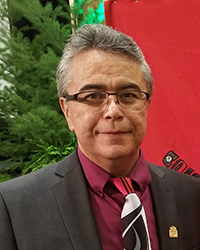
Tribal Chief Tyrone McNeil is Stó:lō and a member of Seabird Island Band. He has extensive experience working to advance First Nations languages and education, collaborating with First Nations across the country, and developing agreements and partnerships with government. Tribal Chief McNeil manages a First Nation construction company that employs up to 70 Indigenous men and women, with expertise in Operational Health and Safety, safety audits, human resources management, operations and budgeting in civil construction and pipeline industries.
Tribal Chief McNeil works closely with the Indigenous Advisory and Monitoring Committee (IAMC) for the Trans Mountain Expansion and Existing Pipeline, including as a member of several leadership and sub-committees, driving changes to improve practices of regulators to better align with the United Nations Declaration on the Rights of Indigenous Peoples, and to advance reconciliation. He holds numerous leadership positions including, President of Stó:lō Tribal Council, President of First Nation Education Steering Committee, AFN Chiefs Committee on Education rep for BC, Chair of Emergency Planning Secretariat, Chair of Seabird College, President of the Sqewqel (Seabird) Development Corporation and Standing Chair of Union of BC Indian Chiefs.
Tribal Chief Tyrone McNeil is an active hunter, fisher and gatherer and looks forward to teaching his four grandchildren as he has been taught and learned.
Kaella-Marie Earle, Vice-Chairperson

Kaella-Marie Earle is an Anishinaabekwe from Wiikwemkoong Unceded Territory and Aroland First Nation. She currently works at Enbridge in hydraulic system design engineering for liquid pipelines across Canada and the US. She previously worked at Enbridge in engineering construction field operations where she managed storage and transmission expansion work and integrity of major natural gas pipelines. She additionally serves as Vice-Chairperson of the Indigenous Advisory Committee of the Canada Energy Regulator, working with a team of Indigenous leaders across Canada to advise the Board of Directors on building strategy for the inclusion of Indigenous people in energy as well as the implementation of UNDRIP. She holds an Advanced Diploma in Chemical Engineering Technology from Cambrian College as well as a Bachelor of Chemical Engineering from Laurentian University. Ms. Earle also served as a former member of the NWMO Indigenous Council of Youth and Elders, as previous Co-Chair of the Indigenous Inclusion Committee for the Young Pipeliners Association of Canada, and other leadership roles on energy transition and the inclusion of women in energy. Ms. Earle’s career goal is to weave her Anishinaabe cultural values into her engineering work in a way that will lead the oil and gas industry to a lower carbon energy future, especially in frontline operations.
Harvey McLeod
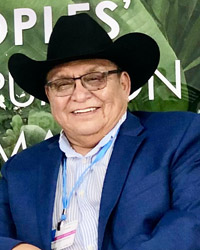
Harvey McLeod served as the Chief for the Upper Nicola Band for nine years with his last term concluding on March 20, 2023. He has approximately 40 years of experience in working on First Nations issues including developing and bridging communities on the executive, political, relationship and partnership level.
Harvey McLeod continues to serve as a Director for the BC Assembly of First Nations, and has contributed extensively and directly to the development and operations of the Indigenous Advisory Monitoring Committee (IAMC) for the Trans Mountain Expansion and Existing Pipeline.
Scott Patles-Richardson
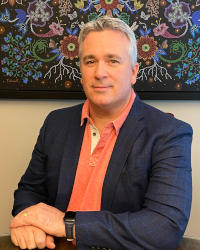
Mr. Scott Patles-Richardson is the founder of Indigenous Financial Solutions, a First Nations-owned company focused on economic development for Indigenous communities across Canada. He has extensive experience advising Indigenous communities, corporate finance, mergers and acquisitions, and has negotiated for First Nation and Métis communities in the area of land claims and Impact Benefit Agreements, specific to energy and resource development projects.
Mr. Patles-Richardson is also the CEO of an Indigenous private-equity fund, Métis Infinity Investments, and is the majority shareholder of Nations Translation Group (NTG) and acts as their Executive Chair. NTG is one of Canada’s largest privately-held translation companies and is 100% First Nation owned and controlled with the balance of the shares held by the Little Red River Cree Nation’s investment arm. He has previously worked in leadership roles with Ishkonigan Consulting and Mediation, Tribal Council Investment Group of Manitoba, Scotiabank, and Royal Bank of Canada. Mr. Patles-Richardson is a Mi’gmaq citizen from Pabineau First Nation in northern New Brunswick of which he has been active as a key senior advisor.
Chief Matthew T. Peigan
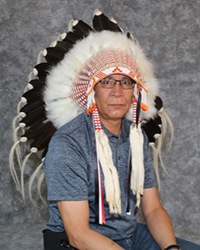
Chief Matthew T. Peigan is Chief of the Pasqua First Nation. Chief Peigan is the youngest of 5 boys to parents Ronald Peigan Sr. and Grace L. Peigan. He was first elected in 1993-2001 and again in 2011, currently serving a fifth consecutive term. Upon his initial election in 1993, Chief Peigan was the youngest serving Chief in Canada at just 26. Chief Peigan has also served as Director of Operations and Housing Coordinator with Pasqua First Nation, and as Flood Claim Lead Negotiator for other First Nations.
Chief Peigan has been very active in engaging with industry as well as in interventions before the Canada Energy Regulator (formerly National Energy Board), including but not limited to the Energy East Project and Enbridge Line 3 Replacement Project. Chief Peigan is also a member of the Indigenous Advisory and Monitoring Committee (IAMC) for the Enbridge Line 3 Replacement Project. Chief Peigan is committed to both his home First Nation and to the advancement of all First Nations, and is a strong advocate for environmental, air and water protection measures. Chief Peigan was nominated to sit as a member of the Indigenous Advisory Committee by the Assembly of First Nations.
Marci Riel

Marci Riel is the Senior Director of Energy, Infrastructure and Resource Management (EIRM) at the Manitoba Métis Federation (MMF), the National Government of the Red River Métis. The Department houses six (6) Portfolios, with eight (8) of the twenty-three (23) Ministers that together form the MMF Cabinet. EIRM is responsible for advocating for the rights, claims, and interests of Red River Métis Citizens by engaging with governments and proponents regarding the impacts of proposed projects. The department administers programming and initiatives which support environmental literacy, stewardship of our lands and waters, as well as the resurgence of Traditional Economies across our National Homeland.
Marci is not an elected representative of the Red River Métis but rather her role on the IAC is to best represent the needs of Red River Métis citizens and to assist Canada and the Canada Energy Regulator (CER) in better understanding the lifecycle impacts of projects on their collectively held rights, claims and interests. Ms. Riel holds a Master’s Degree in Sociology and prior to joining the Manitoba Métis Federation in 2011, Marci worked in the field of public safety and crime prevention.
Marci is the mother of two sons and together with her husband Kevin is proud to be raising the next generation of Red River Métis citizens. Marci lives in Winnipeg, Manitoba – in the heart of the National Homeland – on one of the original Red River lots next to the historic Riel House site.
Tristan Zachow
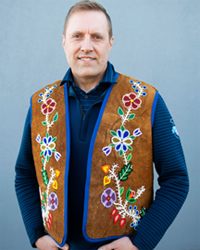
Tristan Zachow is the Chief Executive Officer (CEO) of SaskMétis Economic Development Corporation (SMEDCO) where he has been employed for over 20 years. SMEDCO is a Métis Capital Corporation that specializes in developmental lending for the start-up, acquisition, or expansion of Métis owned or controlled enterprises, and business advisory services. He is also the CEO of Muskwa Development Corporation, a wholly owned economic entity of the Métis Nation –Saskatchewan, mandated to engage in strategic investments through equity positions, strategic partnerships, and financial holdings. Recently, he was appointed as the inaugural Chair of the association of Métis Capital Corporations, which consists of four high-performing Métis Capital Corporations located throughout the métis Homeland.
Tristan is a proud Saskatchewan Métis originally from the Prince Albert area where his ancestors go back well over a century. He is an avid hunter that provides for his family and friends throughout the year. His post-secondary education includes certification as an economic development officer from Dumont Technical Institute and a certificate in business administration from the University of Saskatchewan's Edwards School of Business.
Tristan's expertise includes: developmental lending, Indigenous economic development leadership, intergovernmental affairs, corporate development and operations, capital attraction, business development and entrepreneurship, product frame-working and implementation, financial negotiations, governance, and delivering results in complex situations.
Félix Aupalu
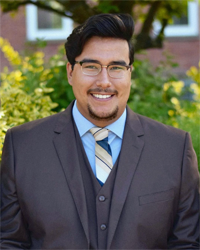
Félix, a young visionary with roots in the Canadian Arctic, worked at one of Canada’s major mining operations, Glencore’s Raglan Mine, situated in his home region of Nunavik. Holding diverse HR positions, he went on to earn a Bachelor’s degree in Industrial and Labour Relations and a Graduate Diploma in Management from McGill University. Serial entrepreneur at his core, he co-founded X Capital Holdings Corp. during the pandemic, as the executive chairman, overseeing three Canadian subsidiary corporations in the Eastern Townships of Québec, which employed numerous teams, gained local market traction, and specialized in various niches. As an alumnus of McGill, a Pathy Fellow, and an international fellow of the Fratelli Tutti Political School, Félix developed a deeper understanding of community development focused on equity-seeking initiatives. Inspired by his late father, a survivor of the Federal Day School system, Félix established the non-profit organization All Arctic, dedicated to enhancing the lives of Arctic communities through program development and implementation. In his leisure time, he enjoys hunting in the Tundra, honing his barbering skills, playing soccer, and traveling. Proud of his Inuk and Québécois heritage, Félix is fluent in multiple languages, bringing a unique Inuit perspective to discussions on Canada's energy future. With the Arctic on the forefront of the new energy & natural resource economy, it has never been more important to have Inuit stewardship and authentic co-development as Canada signals it is ready for reconciliation. Since October 2023, Félix collaborates with other professionals within his ITK-nominated role at the IAC. Inuit Tapiriit Kanatami, previously known as the Inuit Tapirisat of Canada, is a non-profit organization in Canada that represents over 65,000 Inuit across Inuit Nunangat and the rest of Canada. Their mission is to ‘’serve as a national voice protecting and advancing the rights and interests of Inuit in Canada.
- Date modified:
